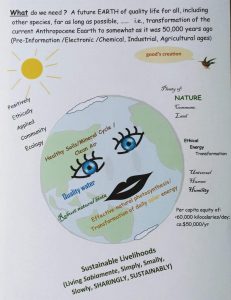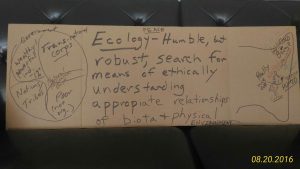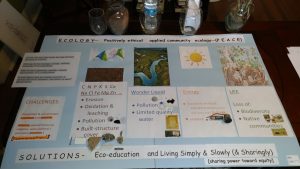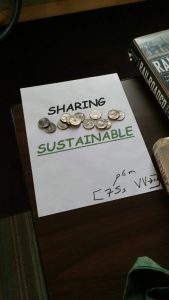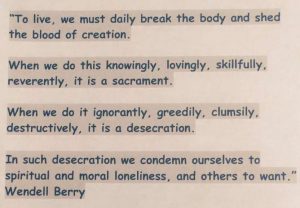Recycling mineral resources takes energy which in being produced and used causes pollution and environmental degradation (recycling-is-not-the-ultimate-answer principle).
To reduce resource waste and resource supply interruptions, get as much as possible of what we need locally, and dispose of or recycle wastes locally (principle of localism).
Stress the use of perpetual and renewable resources and use renewable resources no faster than they’re replenished by natural processes (principle of sustainable yield).
Everyone is downwind or downstream from everybody (principle of the global commons).
Organized or concentrated energy is high-quality energy that can be used to do things; disorganized or dilute energy is low-quality energy that is not very useful (principle of energy quality).
In any conversion of energy from one form to another, high-quality, useful energy is always degraded to lower-quality, less useful energy that can’t be recycled to give high-quality energy; we can’t break even in terms of energy quality (second law of energy or law of energy-quality degradation).
Everything runs on moderate- to high-quality energy, that can’t be recycled, so choose and use energy resources wisely (principle of energy use and flow).
Everything is connected to and intermingled with everything else; we are all in it together (second law of ecology, or principle of interrelatedness).
The earth’s life support systems can take a lot of stress and abuse, but there are limits (laws of limits).
No population can keep growing indefinitely (principle of carrying capacity).
Nature is not only more complex than we think but more complex that we can ever think (principle of complexity).
The market price of anything should include all present and future cost of any pollution, environmental degradation, or other harmful effects passed on to society and the environment (principle of internalizing all external costs).
The more things you own, the more you are owned by things (principle of overconsumption and thing tyranny).
Human population growth ultimately makes democracy and individualism impossible (principle of freedom erosion).
Don’t ever call yourself a conservative unless what you want to conserve is the earth (principle of true conservatism).
We are a part of nature (principle of oneness).
We are a valuable species, but are not superior to other species; all living beings, human and nonhuman, have the same inherent worth (principle of humility).
Every living species has a right to live, or at least struggle to live, simply because it exists; this right is not dependent on its actual or potential use to us (respect-for-nature principle).
Our role is to understand and work with the rest of nature, not conquer it (principle of cooperation).
It is wrong to treat people and other living things primarily as factors of production, whose value is expressed only in economic terms (economics-is-not-everything principle).
We have a right to protect ourselves against harmful and dangerous organisms but only when we cannot avoid being exposed to such organisms or safely escape from the situation; in protecting ourselves we should do the least possible harm to such organisms (principle of self-defense).
We have a right to kill other organisms to provide enough food for our survival and good health and to meet other basic survival and health needs, but we do not have such rights to meet nonbasic or frivolous wants (principle of survival).
When we alter nature to meet what we consider to be basic or nonbasic needs, we should choose the method that does the least possible harm to other living things; in minimizing harm it is in general worse to harm a species that an individual organism, and still worse to harm a biotic community (principle of minimum wrong).
We must leave the earth in as good a shape as we found it, if not better (rights-of-the-unborn principle).
No individual, corporation, or nation has a right to an ever-increasing share of the earth’s finite resources; don’t let need slide into greed (principle of enoughness).
To prevent excessive death of people and other species, people must prevent excessive births (birth-control-is-better-than-death-control principle).
Everything we are and have or will have ultimately comes from the sun and the earth; the earth can get along without us, but we can’t get along without the earth; an exhausted earth is an exhausted economy (respect-your-roots or earth—first principle).
To love, cherish, and understand the earth and yourself, take time to experience and sense the air, water, soil, plants, animals, bacteria, and other parts of the earth directly; learning about the earth indirectly from books, TV, images, and ideas is not enough (direct-experience-is the-best-teacher principle).
Learn about and love your local environment and live gently within that place; walk lightly on the earth (love-your-neighbor principle).
……………………………………………….
1 From a longer list in: Miller, G. Tyler, Jr. 1990. Resource Conservation and Management. Wadsworth Publishing Company.
pbm
[ 7 Ss / VV->^^ ]
